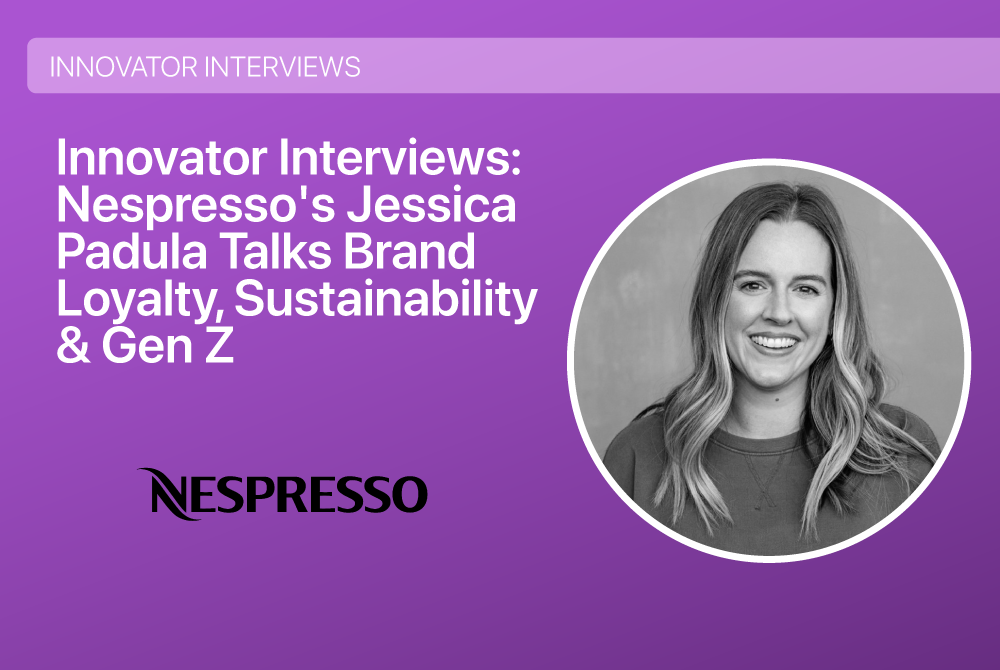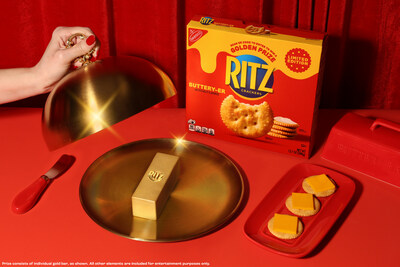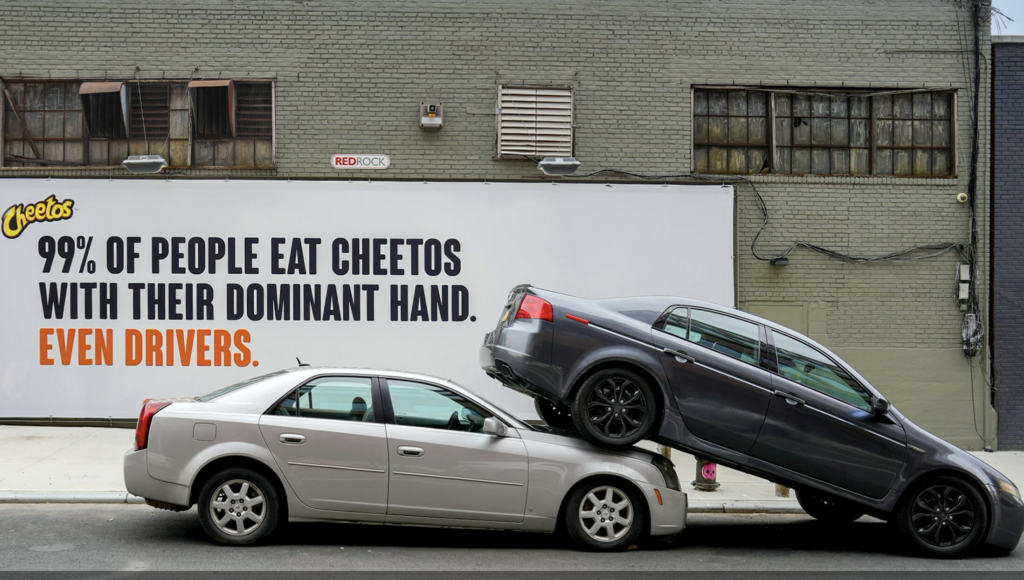Nespresso’s Jessica Padula, vice president of marketing & interim head of sustainability, has been with the Nestle coffee brand for seven years, but has been heading up marketing since January.
The brand awareness has grown significantly since she joined the company. “I always joke that when I first started, people looked at me a little quizzically, maybe they had heard of it but they weren’t quite sure what we did,” she says. “Now we’ve had this is our sixth round of George Clooney campaigns. Awareness of the brand and even familiarity and understanding of who we are and what we offer has fundamentally shifted.”
Padula’s job has expanded from introducing the Nespresso brand into the zone of educating consumers on the coffee experiences they offer. “We’re really thinking about that broader story that we can tell,” she explains. “What’s unique? What’s our point of difference? The consumer needs to know first and foremost, what’s in it for them. It’s the great taste of the coffee. We might say quality, but they need to know quality equals this amazing thing when they go to sip it.”
Nespresso accomplishes this by building an emotional connection to the brand. “The coffee category sits in this food and beverage space, but it’s so much more meaningful to consumers,” says Padula. “They describe Nespresso as life changing when they’ve experienced it. It’s not just a functional beverage that wakes them up in the morning, it’s really more of a ritual.”
The brand marketing strategy is two-fold. The idea is to get prospects to try the product, then it’s about building brand love once they are in the Nespresso community. Additionally, the brand is positioning itself as a home coffee brand.
“Increasingly, we’re seeing people coming to Nespresso, who were primarily out-of-home coffee drinkers,” she explains. “When consumers are pressed from an economic reality standpoint and their dollars having to stretch further they are still willing to invest in something that’s everyday luxury or attainable luxury. It’s the lipstick index, you’re still willing to invest in something that’s an everyday luxury that really makes you feel good. It goes back to that emotional connection. The idea is that you can still get that beautiful experience and you can get it at home for a lower price than you might have realized.”
Prior to her time at Nespresso, Padula worked at Swarovski, WhiteWave Foods and Grey Group. Brand Innovators caught up with Padula from her home office in New York to talk brand loyalty, sustainability and Gen Z. This interview has been edited for clarity and length.
Can you talk about how obviously Nespresso is a product that you will continually buy?
We have an amazing CRM team. As a DTC brand that’s always been in our DNA because we have this amazing data of direct purchasers. We can bring them new and different coffee experiences and keep them engaged to buy. But more and more, we’re moving into this world where we think about the consumer experience overall, and how do you market throughout that entire experience? There’s two pieces. One is subscription. We offer what we call easy order, recurring purchases available through our direct channels. It lets you set it and forget it, which is very consistent with the industry at large. Our retail partners want to do the same thing. We want to make it easy and rewarding for people to come to us.
The other piece is what differentiates DTC. The reason to shop with us directly and keep coming back to Nespresso is because we actually offer the widest portfolio. We’re launching limited editions and new coffee experiences, you can always get them first and usually exclusively through our direct channels. There’s this other element of loyalty, which is so much more than just the transactional element. I feel like this brand knows me and understands me. That’s where loyalty comes into play. That direct relationship with the consumer is something we don’t take lightly. We invest a lot of time and energy in it.
You talked about this emotional connection to the product. Can you talk about the importance of why emotion is important in your marketing?
As a brand person, if there’s no emotion associated with the product, I couldn’t do the branding. We are by nature as human beings emotional beings. If you are purely transactional, lacking that emotion as a brand, then you’re just a business. I might buy the same brand, because I like it. But I don’t have an emotional connection to the brand of toilet paper I buy. That’s fine. It works in that category.
But for a coffee for a category that you actually consume. it’s something I’m choosing to put in my body. Every year, these really deep dive focus groups with consumers and I joke that they’re more like voyeuristic therapy sessions than they are coffee focus groups, because it’s really trying to understand what makes people tick. Our consumer is really unique in that they’re constantly striving to improve themselves to improve the world around them and coffee plays a really central role in that. It is first and foremost that the functional reality of it helps me start my day and get up and go.
But there’s so much more to it. It’s really about feeling like they have a moment to themselves to set all of their intentions for the day and then power all that potential that they feel. We try to thread that through everything we do from a marketing standpoint.
How are you thinking about brand purpose?
We are first and foremost a purpose-driven brand. We’ve always had purpose at our core, we just didn’t communicate it. We’ve always thought about the entire value chain in how we source our coffee for almost 40 years. How do we give back but not just in service of saving the world, but actually in service of protecting coffee, because we want coffee to be around for the next 100 years. It might not be if we don’t do things the right way.
Sustainability to Gen Z means so much more than just Earth and green sustainability. Their definition of sustainability is all about social justice and diversity and inclusion. If you think about cultivating different communities who are farming, coffee, different income realities, it’s always been part of our DNA too so it’s really natural for us now to lean into that space.
We’ve tried to tell this story about faraway lands and farmers in a lot of different ways in the US and it didn’t resonate with the US consumer for whatever reason. It felt very far away. Coffee was born in Ethiopia. You’re helping Ethiopian women who want to learn how to become coffee farmers. That’s an amazing story but it didn’t fully connect in the way we wanted it to in the US. So we said, how can we mimic all of the work we do in the coffee value chain and bring it to a US consumer in a more relevant way. We intentionally focused on social impact here in the US. Lst March, we launched a partnership with the Ali Forney Center, which is the largest homeless youth center for LGBTQ+ youth in New York City –our backyard as a corporate team. This is a cause that matters to our employees.
Can you talk about how Gen Z is impacting your marketing and how you’re thinking about the audience?
Gen Z are guided by values, probably more than any other demographic or generation I’ve seen. They really want brands that they can see themselves in, that they can connect with. It’s not just a singular purchase, it’s really saying something about themselves. It’s not about what you are showing from a brand logo standpoint, but actually what you are quietly saying and representing by being associated with a brand. We find that when we’re hiring influencers, it’s really important to us that they connect with our brand purpose.
From a coffee standpoint, Gen Z’s definition of coffee is cold coffee. And for years, we never talked about cold coffee. But of course, you can make iced coffee with our machines. It’s very easy. How do we educate, train and almost start to flip our visualization and the context for coffee, that goes all the way up through like product innovation. We just launched cold brew coffee, for example. That’s a reflection of Gen Z influencing product innovation and coffee innovation.
But also in how we communicate, something as simple as George Clooney in our new ad is holding a cold coffee mug. We have had to really evolve our visualization of coffee with celebrities, which is really a reflection of the Gen Z influence.
Can you talk about how your experience in the advertising world on brands like Cover Girl, Clairol, Pantene, Downey helped prepare you for this role?
I had the benefit of working on a lot of upstream product development and innovation. A good chunk of my time was spent not on actually producing ads, which you assume from an advertising agency standpoint, I actually worked on the global account for Pantene, where we were thinking about what the brand was going to be in five years down the road and writing concepts for future product ideas. I’ve referenced our focus groups in espresso and things like that.
I knew I wanted to go brand side, in order to do that, I had to specialize in something that nobody else knew how to do, because I didn’t have my MBA. At the time, you couldn’t get your foot in the door at many of these brands without it so I specialized in social media as a way to say, this is something your brand marketers don’t know how to do. I grew up in the food space at White Wave Foods, which is now part of Danone.
At Swarovski it was about placing our products with people who elevate the brand, world tours with Madonna and JLo, and things like that, that really allowed the brand to live in that luxury space. Then I got the call from Nespresso and I said, I don’t really want to go back to food, it wasn’t my specialty. But what’s been super fascinating is this merging of luxury food and that brand strategy that I learned in the advertising agency world. Nespresso is really hard to pinpoint and really hard to compare to other brands because it’s an everyday product but it’s more luxurious and higher quality. It’s actually been this perfect amalgamation of all of my background of bringing those worlds together.



